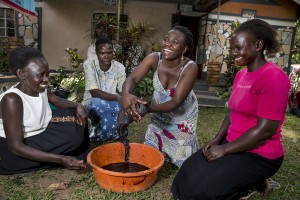
PAKAM KISOKO, UGANDA – JULY 25: Women from the Pakamu Women and Girls group meeting to make Tie and Die garments as an income generating activity. They sell the garments in the market and use the income to improve their livelihood and provide for their families. July 25, 2014 in Pakam Kisoko, Uganda. (Photo by Jonathan Torgovnik/Reportage by Getty Images)..
Then she learnt about a local Non-Governmental Organisation (NGO) called Women and Land in Zimbabwe (WLZ), which changed her life – helping her to regain hope and become a respected member of her community.
She joined a group of women in Zimunya village who started a ‘Tie and Dye’ project. The sale of fabric and garments made from the tie-dyed cloth became an income-generating activity for this group. Tie dyeing is a method of producing patterns on fabrics by using knots or objects and various dyes to produce multi-coloured fabric with attractive designs.
The group makes and sells tie-dyed textiles, garments and scarves. Income derived from the sales has improved their livelihoods enormously.
One vision
The WLZ was formed in 1998 by a coalition of activists and organisations with one vision, namely the advancement and empowerment of disadvantaged women and the total eradication of gender discrimination. It is particularly focused on the eradication of gender discrimination in the access, ownership and control of land, natural resources and related opportunities for sustainable livelihoods.
Once Zambuko started attending the training meetings she was empowered and provided with the means to reshape her life. For the 12 group members the project has indeed opened doors.
“When my husband died, my in-laws ignored me and I lost all hope, but my life changed when I became interested in ‘Tie and Dye’ and learnt to do things for myself. We buy plain cloth and dye it using the bark of various trees. We produce fabrics with various designs in five meter lengths that retail at $5 per meter,†explained Zambuko. The women are extremely creative – using all sorts of materials, from coke bottle tops to stones, to make the patterns on the fabric.
Since receiving the training, she has gained confidence and has been chosen to head the committee that leads the group. “It has now been 10 years since the death of my husband and I am providing for my family,†she said.
A future
Another member of the group Laiza Denhere said: “This project has taught me how to sew and to tie-dye. I now have a future, like others.”
The members of the group share US$200 each month. This figure can rise if orders increase and they can ultimately get $250 – $300 each.
“As women we are all connected somehow. We sit around and do our tying and dyeing together. We counsel each other while doing our work at the same time,†she said.
Customers include local individuals, shop owners and tourists.
“We have managed to do brisk business with some shop owners who come and place orders with us. We have also realised that some tourists have been buying our products,†Zambuko said.
“As women we are living well, helping each other to maintain our families in the community. I want to encourage other women to come to learn and meet other people in order to transform their lives. Men should allow women to come and learn so that they improve their way of life. That is a sign of respect for each other,†said Zambuko.
The women said they were planning to expand their business and increase their profits to enable them to continue sustaining their lives.
More info
If you would like more information or help to start a similar project in your area, please contact WLZ – Tel: 04 303370
Email: wlz@mweb.co.zw
www.wlzimbabwe.org


